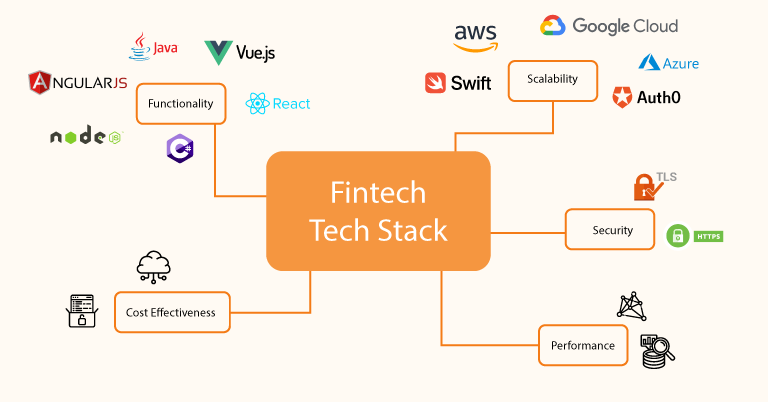The ideal tech stack should not only meet the specific functional requirements but also address key considerations such as scalability, security, performance, and cost-effectiveness. In this blog post, we’ve looked around the most popular discussion topics to delve into the most favored tech stack for fintech applications, exploring the factors that make it stand out in the competitive market. Let’s get started!

Functionality: Crafting User-Centric Experiences
Front-end Technologies:
Fintech’s user interfaces require seamless, swift, and user-friendly experiences.
React: an acclaimed front-end technology, stands out as a preferred choice. With its emphasis on reusable components, React enables the creation of user-centric interfaces. Developers leverage React’s capabilities to build feature-rich dashboards, implement automation, and seamlessly integrate push notifications.
Angular: Renowned for its dynamic UI optimization, Angular plays a crucial role in crafting interfaces that meet the high standards of the industry. Developers appreciate Angular’s capabilities in enhancing user experiences, making it a valuable asset for feature-rich dashboards and streamlined automation.
Vue: With its adaptable architecture, is a noteworthy front-end technology contributing to user-centric designs in fintech applications. Its flexibility empowers developers to create interfaces that align with evolving user demands. Vue’s capabilities are harnessed for building feature-rich dashboards, implementing automation, and seamlessly integrating push notifications, making it a significant player in the fintech front-end landscape.
Back-end Technologies:
Java: Java is a robust choice for backend development, offering multithreading capabilities that efficiently support numerous transactions concurrently. Ideal for financial institutions prioritizing speed and reliability.
Python: Renowned for simplicity, Python’s extensive library ecosystem, and clear syntax make it a versatile language. Its machine learning and AI libraries are valuable for data-intensive tasks in fintech backend development.
C#: C# is an object-oriented language within the Microsoft .NET ecosystem, preferred by fintech companies for its heightened performance and security in backend development.
Node.js: With its event-driven architecture, excels in real-time and scalable financial applications. Its non-blocking nature ensures lightweight responsiveness, even with a high volume of simultaneous connections. Perfect for fintech backend development where real-time processing is crucial.
Scalability: Growing with Demand
Cloud Providers
AWS: a cloud computing pioneer, ensures unparalleled scalability for fintech applications. Its comprehensive tool suite and machine learning capabilities enable seamless workload distribution, allowing fintech solutions to scale dynamically without sacrificing performance.
GCP: Google Cloud Platform (GCP) provides a flexible environment for fintech’s scalability needs. With advanced services in AI/ML and data analytics, GCP empowers developers to create robust, scalable applications tailored to the dynamic demands of the fintech landscape.
Azure: Microsoft Azure offers integrated solutions for scaling financial services data management. With workflow automation and intelligent tools, Azure ensures fintech applications can adapt to varying demands while maintaining efficiency.
Microservices Architecture: Ensuring Flexibility and Maintenance
Microservices architecture breaks down complex fintech applications into modular, independent services. This not only enhances performance but also ensures scalability and easier maintenance. The ability to revise, enhance, and expand individual services without disrupting the entire application aligns perfectly with the fluctuating user engagement typical in fintech.
Security: Safeguarding Sensitive Financial Data
Secure Authentication and Authorization
OAuth for Controlled Access: In fintech, safeguarding sensitive financial data is paramount. OAuth plays a pivotal role by enabling controlled access to user accounts. This enhances data privacy and provides users with authority over their financial information.
JWT for Swift Security: JSON Web Tokens (JWT) are instrumental in quickly detecting unauthorized token alterations, fortifying fintech applications with robust security layers. In the realm of secure authentication and authorization, JWT ensures the integrity of sensitive financial data.
Data Security
HTTPS and TLS: The integration of HTTPS and TLS protocols is critical, ensuring compliance with regulatory standards and establishing user trust. These protocols guarantee secure data transmission in the ever-evolving landscape of financial technology.
Encryption Algorithms (AES and SHA): The utilization of encryption algorithms, such as Advanced Encryption Standard (AES) and Secure Hash Algorithm (SHA), is indispensable for data security in fintech. These algorithms play a vital role in safeguarding financial data not only during internet transmission but also in storage. Their robust mechanisms ensure the integrity and confidentiality of sensitive information, aligning with the stringent security requirements of the financial industry.
Performance: Processing Big Data with Efficiency
Big Data Analytics: Fintech applications deal with massive volumes of structured and unstructured data. Big data analytics tools like Apache Spark, Hadoop, and Flink offer efficient processing capabilities. These tools enable the analysis of transactional data, customer behaviors, and market trends, providing invaluable business intelligence for enhanced performance.
Machine Learning Models: Machine learning is increasingly vital in fintech for risk assessment, fraud detection, and customer behavior prediction. Libraries like Scikit-learn, TensorFlow, and PyTorch empower developers to implement intricate machine learning models. This capability is essential for crafting personalized products and staying ahead in the competitive fintech landscape.
Cost-effectiveness: Balancing Innovation and Budgets
Open-source Frameworks: Open-source frameworks contribute significantly to cost-effectiveness in fintech development. React, Spring Boot, Django, Flask, and Express are favored for their versatility, community support, and cost-efficient development. Leveraging these frameworks allows fintech startups to innovate without compromising on budget constraints.
Cloud Service Providers: Cloud providers offer flexible pricing models, allowing fintech companies to optimize costs based on usage. AWS, GCP, and Azure provide extensive toolkits that cover machine learning, data analytics, and more, enabling fintech startups to pay for what they use and scale efficiently.
Conclusion
As fintech continues to shape the future of finance, the selection of an appropriate tech stack becomes a strategic decision for companies aspiring to deliver innovative, reliable, and cost-efficient solutions.If you’re seeking adept developers with expertise in crafting tech stacks tailored for fintech, banking, trading, or healthcare, look no further – LARION is the perfect choice.
About LARION JSC
LARION JSC, one of the top Vietnam software outsourcing companies with 2 decades deep industry expertise. We are a 100% Vietnam-based technology company specializing in building highly skilled offshore development teams for healthcare, fintech, banking and trading businesses worldwide. Run by a team of successful entrepreneurs and dedicated technical experts – LARION is a unique symphony where we create a frictionless future for customers with passion, while maintaining full compliance with your needs and objectives.
Find our footprint in many areas such as:
…and more…
Contact us now to explore how our Vietnam-based offshore development center services can be the catalyst for your company’s success in the ever-evolving world of software development.





